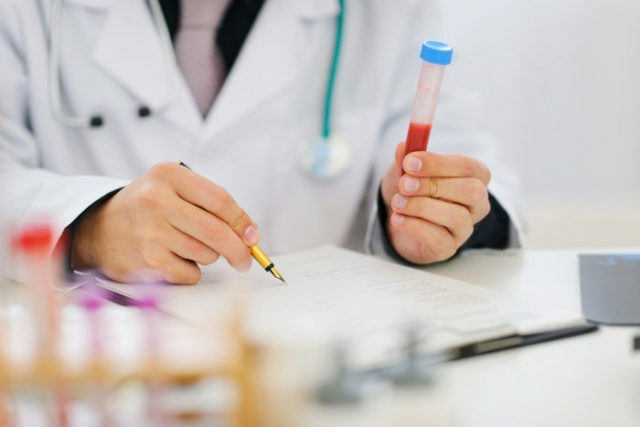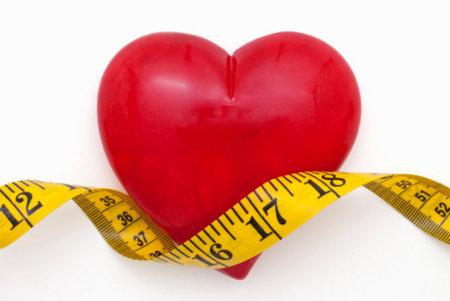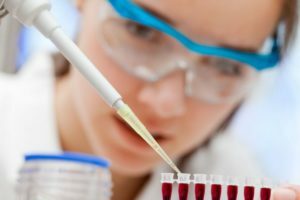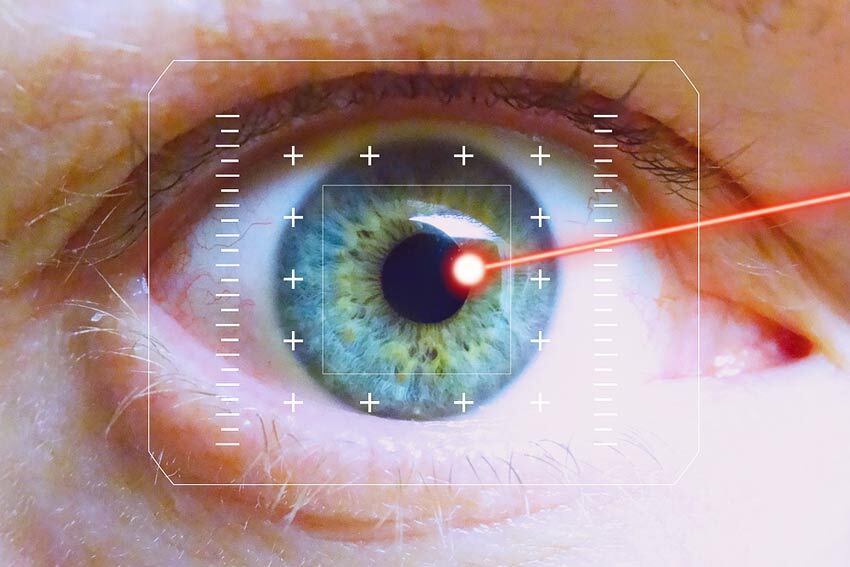 What is the norm of cholesterol in the blood by age in men and women?
What is the norm of cholesterol in the blood by age in men and women? Page Contents
- 1 What is cholesterol and why is it important to observe its norm in the body?
- 2 Why does cholesterol increase?
- 3 Cholesterol "bad" and "good"
- 4 Cholesterol blood table by age
- 5 Cholesterol norm for women by age
- 6 Blood cholesterol by age for men - table
- 7 How to lower blood cholesterol level - diet andcorrect nutrition
Not many people know that the cholesterol in the blood for men and women can differ significantly by age. For clarity, we have resulted in special tables. But first things first.
Today, any of us have heard about cholesterol and about the harm it does to health. Far from everyone understands that cholesterol can be "good" and "bad", and knows about what functions it performs in the body. Its level - one of the important indicators, indicating the state of lipid metabolism and the main factor indicating the likelihood of developing atherosclerosis. This parameter is very important in the treatment of diseases of the cardiovascular, endocrine system, liver and kidney pathologies. But not every patient is able to orient in the results of the analysis and to understand whether it corresponds to the norm. Let's find out what the age of cholesterol is and find out why it should be avoided in the blood.
What is cholesterol and why is it important to observe its norm in the body?
 What is cholesterol
What is cholesterol Cholesterol( or cholesterol) refers to polyhydric fatty alcohols and is one of the structural components of cell membranes. In other words, it imparts strength to cell membranes and, if analogous to the construction process, cholesterol acts as a reinforcing mesh, without which brickwork does not do.
Without this substance, synthesis of sex hormones, vitamin D, bile acids is impossible. Most of the cholesterol contains erythrocyte cells( 23%) and liver( 17%), it is in the nerve cells and in the membranes of the brain. Most of the cholesterol is synthesized in the liver( up to 80%).The remainder - enters the body with food of animal origin( butter, eggs, meat, offal, etc.).
Without cholesterol, the digestive process is impossible, since it is from it that the bile salts produced in the liver are responsible for the breakdown of fats in the intestine. Cholesterol plays an important role in the development of sex hormones( estrogen, testosterone, progesterone) responsible for the human reproductive system.
If the level of this substance in the body decreases, below the permissible values, there is a weakening of immunity and resistance to infections and diseases. Cholesterol promotes the production of the hormone cortisol in the adrenal glands and takes part in the synthesis of vitamin D. In a word, cholesterol is an important link, without which the normal functioning of the body is impossible.
Why does cholesterol go up?
 Why the cholesterol
Why the cholesterol rises The reasons leading to the development of pathology are many. The most common of them:
- Hereditary factor. If the immediate relatives of the patient suffer from atherosclerosis, ischemic disease, have a history of stroke or heart attack, then the likelihood of hypercholesterolemia in the blood increases significantly.
- Absence of motor activity, overweight, obesity.
- Incorrect and unbalanced food, with a predominance of fatty and fried foods.
- Chronic stress, bad habits. Especially smoking( even passive) and alcohol abuse.
- Endocrine system diseases;
- Arterial hypertension.
- Pathologies of the liver, kidneys, pancreas.
- Tumor processes, malignant neoplasms.
- Taking certain medications.
- Age factor( the risk of disease increases after 50 years).
This is far from a complete list of factors that can raise the level of cholesterol in the blood. Identify the exact cause of the pathological condition will help in the comprehensive examination and advice of different specialists( cardiologist, therapist, gastroenterologist).A patient with a disability should be observed by a specialist and regularly given blood for analysis in order to control the level of cholesterol.
Cholesterol "bad" and "good"
 Good cholesterol
Good cholesterol By itself, this organic compound is not harmful to the body, but only until its concentration in the blood does not exceed the allowable rate. It is important, in what form is presented cholesterol - "good" or "bad".Useful cholesterol without obstacles moves through the vessels, penetrates into cells and tissues. Another form - damages the vascular walls, settles inside in the form of cholesterol plaques and disrupts the circulatory processes, which increases the risk of heart attack or stroke.
Correct or "good" cholesterol is a protein-fat particle of high density( HDL-lipoprotein).In medical practice, it is called alpha cholesterol.
Dangerous cholesterol circulates in the circulatory system in larger particles of low density( LDL-lipoproteins).It is this organic compound that is prone to clogging of blood vessels and the formation of plaques on their walls. There is another type of cholesterol - it's very low density lipoproteins( VLDL), they are synthesized directly in the intestinal wall and serve to transport cholesterol to the liver. But in the blood this fraction practically does not appear, therefore its role in the violation of lipid metabolism is minimal.
The sum of "bad" and "good" cholesterol is exactly the total value, which is determined by biochemical blood analysis. If the cholesterol concentration is increased, an in-depth study of the lipid profile of the blood is performed, which allows to determine the level of different forms of cholesterol separately.
High total cholesterol levels in the blood significantly increase the risk of atherosclerosis, coronary heart disease and other dangerous cardiovascular disorders, which can lead to death. A normal and safe level of cholesterol in the blood of an adult is considered to be no more than 5.2 mmol / l.
But recently, experts distinguish the norm of cholesterol in the blood by age and gender. Scientists have found that the content of this organic compound is affected even by the ethnicity of the person and, for example, in the inhabitants of India or Pakistan, this cholesterol rate is much higher in age than the average European.
What is the norm of cholesterol by age? A visual representation is given by special tables, in which the admissible cholesterol values are indicated.
Blood cholesterol rating table by age
| Age | Normal limits( mmol / L) |
| 0-19 | 1200-2300( 3.10-5.95) |
| 20-29 | 1200-2400( 3.10-6,21) |
| 30-39 | 1400-2700( 3.62-6.98) |
| 40-49 | 1500-3100( 3.88-8.02) |
| 50-59 | 1600-3300( 4,14-8, 53) |
The optimal level of total cholesterol is considered to be below 5.2 mmol / l. The maximum allowable level fits into the "plug" from 5.2 to 6.2 mmol / l. But the indicator over 6.2 mmol / l is already considered high, and requires medical treatment.
| Age | Total cholesterol ( mmol / L) | LDL cholesterol ( mmol / L) | HDL cholesterol ( mmol / L) | ||
| & lt;5 years | 2.90-5.18 | 2.90-5.18 | 2.90-5.18 | 2.70-5.18 | |
| 1.76 - 3.52 | 0.96 - 1.81 | ||||
| 15-20 years | 3.08 - 5.18 | 3.08 - 5.18 | 1.53 - 3.55 | 0.91 - 1.91 | 0.91 - 1.91 |
| 1.84 - 4.25 | 0.96 - 2.15 | ||||
| 30-35 years | |||||
| 3.37 - 5.96 | 1.81 - 4.04 | 0.93 - 1.99 | |||
| 35-40 years | 3.63 - 6.27 | 1.94 - 4.45 | 0.88 - 2.12 | ||
| 40-45 years | 3.81 - 6.53 | 1.92 - 4.51 | 0.88 - 2.28 | ||
| 45-50 years | 3.94 -6.86 | 2.05 - 4.82 | 0.88 - 2.25 | ||
| 50-55 years | 4.20 - 7.38 | 2.28 - 5.21 | 0.96 - 2.38 | ||
| 55-60 years | 4.45 - 7.77 | 2.31 - 5.44 | 0.96 - 2.35 | ||
| 60-65 years | 4.45 - 7.69 | 2.59 - 5.80 | 0.98 - 2.38 | ||
| 65-70 years | 4.43 - 7.85 | 2.38 - 5.72 | 0.91 - 2.48 | ||
| & gt;70 years | 4.48 - 7.25 | 2.49 - 5.34 | 0.85 - 2.38 |
| Age | Total cholesterol | LDL-cholesterol | HDL-cholesterol | ||||||||||
| & lt;5 years | 2.95-5.25 | 1.95 - 3.34 | 0.96 - 1.91 | ||||||||||
| 15-20 years | 2.91 - 5.10 | 2.91 - 5.10 | 2.91 - 5.10 | ||||||||||
| 1.61 - 3.37 | 0.78 - 1.63 | 0.78 - 1.63 | |||||||||||
| 1.81 - 4.27 | 0.80 - 1.63 | ||||||||||||
| 30-35 years | 3.57 - 6.58 | 1.71 - 3.81 | 0.78 - 1.63 | 2.02 - 4.79 | 2.02 - 4.79 | 2.02 - 4.79 | 2.02 - 4.79 | 2.02 - 4.79 | 2.02 - 4.79 | 2.02 -7.15 | 2.51 - 5.23 | 0.78 - 1.66 | |
| 50-55 years | 4.09 - 7.17 | 2.31 - 5.10 | 0.72 - 1.63 | ||||||||||
| 55-60 years | 4.04 - 7.15 | 0.72 - 1.84 | |||||||||||
| 60-65 years | 4.12 - 7.15 | 2.15 - 5.44 | 0.78 - 1.91 | 0.78 -| 65-70 years | 4.09 - 7.10 | 2.49 - 5.34 | 0.78 - 1.94 | & gt;70 years | 3.73 - 6.86 | 2.49 - 5.34 | 0.85 - 1.94 | |
The cholesterol norm for women by age
 The norm of the bullet for women
The norm of the bullet for women In women, the increase in the level of cholesterol with age is largely determined by the hormonal restructuring of the organism associated with menopause. In addition, the change in indicators is often observed during pregnancy or can be associated with a variety of factors, for example, with concomitant diseases.
At a young age, metabolic processes in the female body occur much faster, and food( even acute and heavy) is absorbed much faster. Therefore, the level of cholesterol, even with an unhealthy lifestyle, remains within normal limits. However, cholesterol can be stably raised even in youth with the presence of such concomitant diseases as diabetes, endocrine pathologies or liver failure.
The representatives of the weaker sex, overstepped the threshold at 30 years, the cholesterol levels in the blood gradually increase. The risk of hypercholesterolemia increases if a woman smokes, or takes hormonal contraceptives. At this age, you already need to monitor food, because metabolic processes slow down, and the body is already hard to process and absorb food that contains a large amount of fats and carbohydrates.
At the age of 40 -45 years, the production of female sex hormones - estrogens - decreases and the reproductive function gradually dies. With the approach of menopause, the estrogen level drops significantly, and this leads to cholesterol jumps and an increase in its values in the blood. This is the physiological features of the female body, which are largely related to the hormonal background.
At the age of 50, you should pay special attention to your health, diet and lifestyle. It is best to switch to a low-cholesterol diet and limit the consumption of fatty, meat and dairy products, eggs, sweets, animal fats. A special risk group at this age is women who smoke, are overweight and lead a sedentary lifestyle.
Blood cholesterol by age for men - table
 Photo: Norm of cholesterol by age for men
Photo: Norm of cholesterol by age for men Men need to pay special attention to the level of cholesterol in the blood, because, unlike women, their heart and blood vessels are not protected by sex hormones. Moreover, many representatives of the stronger sex are prone to bad habits:
- smoke,
- abuse alcohol,
- overeat,
- give preference to high-calorie and fatty foods.
Therefore, the risk of atherosclerosis and life-threatening conditions( stroke, heart attack) in men is particularly high.
Nevertheless, the dynamics of the pathological process in representatives of different sexes is different. If women with age are experiencing an increase in cholesterol, then in men this show increases to 50 years, and then begins to decline. However, in the strong half of mankind, the characteristic symptoms of hypercholesterolemia often appear:
- angina attacks associated with narrowing of the coronary arteries;
- occurrence of cutaneous lesions with fatty inclusions;
- shortness of breath with little physical effort;
- heart failure;
- pain in the legs;
- micro strokes.
In adulthood, only an active lifestyle, proper nutrition, rejection of bad habits will help men to keep cholesterol at the proper level.
If you have a higher cholesterol in the blood, then we recommend a very effective drug. Find out the price of the Aterol remedy on the official website.
Blood test: how to pass and decipher?
 Blood test for cholesterol. How correctly to decipher?
Blood test for cholesterol. How correctly to decipher? Blood is transferred to cholesterol strictly on an empty stomach, usually in the morning. At the same time, the last meal should not be earlier than 8 - 10 hours before blood sampling. On the eve of the procedure, it is necessary to exclude the intake of alcohol, medications, and avoid physical and emotional stress. Before giving blood, you need to calm down and try not to worry, because excessive anxiety or fear of the procedure can affect the final result.
The results of the study will show your doctor, what is the level of "good" and "bad" cholesterol in the blood. If the level of dangerous low-density lipoprotein( LDL) is above 4 mmol / l, this is already considered a risk factor for the development of cardiovascular pathologies. And you should start treatment and adjustment of lifestyle and nutrition.
If the level of useful cholesterol( HDL) reaches 5 mmol / l - this indicates that it suppresses low-density lipoproteins, flushes them from the walls of blood vessels and thereby protects the heart muscle. If its level falls below 2 mmol / l - the risk of pathological changes increases.
How to lower blood cholesterol - diet and proper nutrition
 Proper nutrition
Proper nutrition Proper nutrition plays an important role in preventing hypercholesterolemia and the development of atherosclerosis. With increased cholesterol, it is very important to exclude from the diet products containing animal fats, cholesterol and simple carbohydrates. This diet will have to adhere to the rest of life. With a slight excess of indicators, proper nutrition will help to lower cholesterol and keep it in norm.
Products that increase cholesterol:
- fatty meat, smoked products, sausages, lard, offal;
- chicken eggs;
- butter, margarine;
- fatty sauces, mayonnaise;
- dairy products with high fat content( cream, cheese, cottage cheese, sour cream);
- fast food, canned food, semi-finished products;
- flour, confectionery;
- sweets, chocolate;
- coffee, sweet fizzy drinks;
- alcohol.
If you have high cholesterol in your blood, you should stop using alcohol, especially beer and wine. In beer wort contains "bad" cholesterol, and semisweet and sweet wines and tinctures contain a lot of sugar, which is harmful for vessels of at least cholesterol. If a sober lifestyle is complemented by a refusal to smoke and physical activity, this will have the most positive effect on cholesterol and vascular status.
If patients aged at the age of hard to play sports, you just need to move more( walk, climb to your floor on the stairs).These measures in combination with proper nutrition will help to improve the body.
Which products are useful? The daily menu should include:
- fresh vegetables and fruits;
- vegetable salads with vegetable oil;
- lean dietary meat;
- vegetable soups;
- beans;
- dairy products of low fat content;
- porridge( buckwheat, oatmeal, millet, rice);
- mineral water, unsweetened fruit drinks, fresh juices.
Bread is better to eat whole-grain, with bran or rye. But fatty fish, which are rich in useful omega-3 acids, can not only be eaten, but also necessary. This will promote the development of useful cholesterol and reduce the volume of low-density lipids.
Medical treatment
 Doctor's consultation
Doctor's consultation If the blood cholesterol level is greatly exceeded, one diet can not be dispensed with. In this case, the doctor will prescribe medicines, taking into account the severity of the condition, the age of the patient and the presence of concomitant diseases.
For the treatment of patients with high cholesterol, statins are most commonly used. Many drugs of this group are capable of provoking adverse reactions and have a fairly extensive list of contraindications.
Therefore, doctors try to prescribe statins of the last, the fourth generation, which are better tolerated and are successfully used even in elderly patients with concomitant diseases. The principle of statins is based on the inhibition of specific enzymes involved in the production of "bad" cholesterol. Simultaneously, the drugs contribute to the production of useful cholesterol and the recovery and purification of damaged vessels.
Another group of medicines is fibrin. Their action is aimed at reducing the level of harmful cholesterol due to the oxidation of fats in the liver. Particularly effective, these drugs are shown in combination with statins. Those patients in whom the use of such medications causes allergic reactions, prescribe dietary supplements based on herbal components, drugs with nicotinic acid, vitamin complexes. In addition, patients are advised to take fish oil, which contains polyunsaturated fatty acids, which help neutralize low-density cholesterol.
Get acquainted with the reviews about the preparation Holedol. This is a very effective way to bring the level of cholesterol back to normal.



